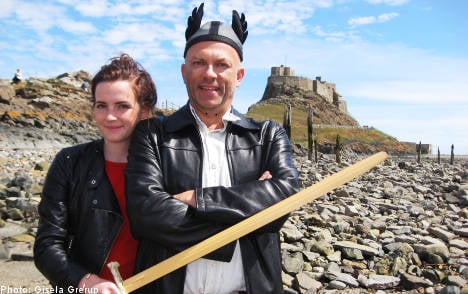No other language in history has spread so far or been spoken with ease by both diplomats and delivery boys, lords and ladyboys. That’s a fact I can personally vouch for, as travelling around the English-speaking world for the series Family Foster has given me the opportunity to chat with all of them. Wherever I went in Jamaica, India, England, Ireland, South Africa, USA and the Philippines, conversation in English was no problem, apart from with one angry baboon and, of course, anyone living in Newcastle.
Now you may be wondering why the series is called Family Foster. Well apart from the fact that it’s a great name (comes from “forester”, so they say), it’s because I’m joined as host by my teenage daughter Julia. Together we meet other people who share our family name pretty much wherever we go. From an extremely charismatic pastor in Jamaica to one of Hollywood’s youngest movie directors to Africa’s best nature documentary film-makers.
But back to the way English has been spread all over the world as if it was God’s own marmalade… In the series we have chosen to look at six factors that have been decisive throughout history: war, trade, education, the written word, the spoken/filmed word, and modern music.
War was crucial. Languages follow political power. In fact, look through the history of Britain in the 18th and 19th centuries and you’ll be hard put to find many years without armed conflict. But the British have always maintained a sense of humour, even when dealing out death and destruction, and some of their wars are delightfully named. How about the “war of Jenkins’ Ear” (against Spain 1739-42) or my personal favourite, the “Pig War” in America in 1859. Happily the only casualty in that one was a single pig. It was Irish.
Trade in goods like spices and tea was also important. India still accounts for more than thirty per cent of the world’s tea production, but another industry is taking the country into the 21st century. In one programme I wander around the city of Chennai, dodging wandering cows and stepping over sleeping or dying dogs while I look up at one of the shiniest, sleekest buildings I’ve ever seen. It’s one of the city’s IT business centres where every employee, whether they work in research, programming or customer services, uses English as their working tongue. One of them told me “Tamil is my local language. It’s my skin. But English is the shirt I put on every day.” Lots of people in India wear that shirt.
War, trade… there have also been fun ways of spreading the language! And here the USA has made a major contribution. Culture! Art! Terrible sequels! Yes, storytelling, on the printed page and in TV and films. Everything from Beowulf, the first written legend in English, all about a vile monster threatening the surrounding castles and farms, to modern classics like Lord of the Rings, all about a vile… well some things haven’t developed all that far. But you get the idea.
A quarter of the winners of the Nobel Prize for Literature have been English-speaking. The others are always described as “obscure” by English-language media when they win. In our series we visit the home of storytelling – Ireland, where writers like Shaw, Yeats, and Joyce emerged to dominate the literary world from a land that had hardly spoken English a century previously. Have you ever tried reading aloud Joyce’s Ulysses on an Irish clifftop in the middle of a freezing Atlantic hailstorm? Into a TV camera? You tend to miss some of the subtleties, in my experience.
Who knows where English will end up? In the last programme in the series I interview the world’s top expert on this, David Crystal, under a tree in rainy Cambridge. Crystal says there are three alternatives to English as a future world language. Spanish is currently the fastest-growing language in the world, Arabic could develop if Islam becomes more important and Chinese is the language of the new economic superpower. Any could be a world language if the nations involved achieve sufficient power. However, the Chinese aren’t pushing their tongue around the world: in fact they are learning English faster than any country ever has.
So it looks like we’re stuck with English as, ironically, the lingua franca.
Family Foster starts on SVT2 at 7.30pm on Friday, 22 January.




 Please whitelist us to continue reading.
Please whitelist us to continue reading.
Member comments